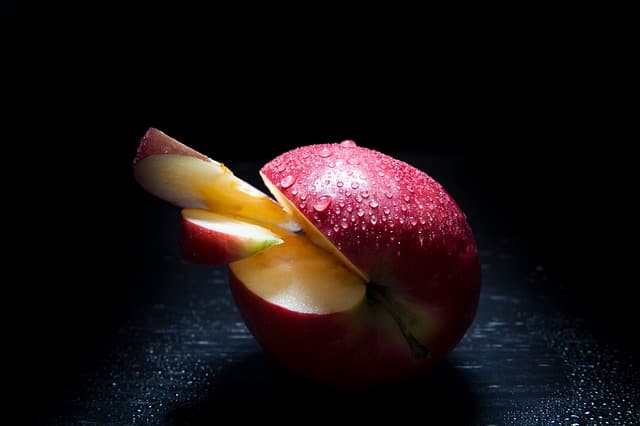Can mice eat apples? If you’re here, that’s probably what you’re wondering. First of all, I must commend you for being a responsible pet owner. It happens all too often that people assume that mice can eat everything. They are omnivores and can eat many different kinds of food, but not every kind of food is safe for your mouse to eat. It’s always a good idea to do your research before feeding your mouse something new. After all, you don’t want to accidentally feed your mouse something that can harm them.
In this guide, I’m going to go over everything you need to know before you feed apples to your pet mouse. I will discuss whether not they can actually eat this fruit, whether or not it’s good for them to eat and much more. Let’s dig in.
If you’re looking for a quick answer, I have that for you too, although I do recommend you to read the whole article. I won’t take too long and it’s useful in understanding more about the subject.
Nevertheless, the short of it is this: Mice can definitely eat apples, but it should be given in moderation. This juicy fruit makes a good treat and many mice enjoy eating it. Make sure that you remove the seeds though because those contain cyanide which is toxic to mice. As long as you remove the seeds and wash the apple before giving it to your mouse, there’s nothing to worry about.
What’s in an apple?

Apples are edible fruits that grow from trees. I’m not going to bore you with the entire history of this plant, because that’s not what we’re interested in here. Instead, let’s take a quick look at what exactly is in this fruit so that we can get an idea of what we’re putting in our mice’s mouth.
One medium-sized apple of about 100 grams contains the following nutrients:
- 52 calories
- 86% water
- 0.3 grams of protein
- 13.8 grams of carbs
- 10.4 grams of sugar
- 2.4 grams of fiber
- 0.2 grams of fat
As we can see from the list above, apples are high in fiber, relatively low in calories, and contain a good amount of water. They are quite high in sugar though, which is why we should not feed our mice too much of this fruit.
On top of that, these fruits contain decent amounts of micronutrients (vitamins and minerals). In particular, it contains good amounts of vitamin C and Potassium.
Are apples good for pet mice?
Now that we’ve taken a look at what’s in an apple, we can determine that it does not contain anything that’s harmful to our mice. In fact, studies have shown that mice benefit from having vitamin C in their diet and apples are a good source of this vitamin. So yes, in moderation, your mouse can definitely benefit from having some of this fruit included in their diet.
Can they eat the seeds?
No, Mice can not eat apple seeds! If you’re feeding this fruit to your mouse you have to make absolutely sure that you remove the seeds. The seeds contain amygdalin which converts into a deadly chemical called cyanide when it’s ingested. Be very careful that you have removed all the seeds before you give your mouse a piece of apple.
Other concerns
Okay, so now we know that mice can eat apples as long as the seeds have been removed. But are there any other concerns? There are 2 other concerns that you have to keep in mind before feeding this fruit to your mouse.
First off, make sure that you properly wash the fruit before offering it. Apples, especially ones that are non-organic, are known to have pesticides on their skin. These are not good for your pet to consume.
The best way to get rid of these pesticides is by washing the apple in a mixture of baking soda and water. If you do not have baking soda, washing them with just water will also suffice.
Secondly, make sure that you do not overfeed your mouse on apples. While mice definitely benefit from having some fruit in their diet, you should not feed them only fruit and definitely not only 1 particular fruit. They benefit most from eating a diverse range of different fruits as a supplement to their normal pellet diet.
How to feed apples to your mouse

Now that you know that this fruit is healthy for your mouse to consume, you might wonder about the best way to go about giving it to them. I suggest that you cut it up into small pieces and only give them one piece of it. The rest you can eat yourself!
Mice are small animals and a whole apple is way too big for them to eat. A small piece of this fruit is more than enough for them. Also, fruits should not make up the majority of their diet, but should rather be given as a treat that supplements their normal pellet diet.
You don’t have to worry about removing the skin of the apple. The skin actually contains most of the fiber and is also rich in other nutrients so I suggest leaving it on so that your mouse will get the most possible nutrition from it.
Do mice like apples?
Most mice love apples, but not all of them do. The only way to find out if your pet mouse likes to eat this fruit is by giving them some and look at their reaction. Most likely, your mouse will love it and eat it. If your mouse does not seem very interested, don’t sweat it. There are plenty of other fruits that they can eat instead.
Alternatives
So, you’ve tried giving your mouse some apple but he doesn’t want to eat it? That’s fine, don’t force it on him. All mice are different and they can have different likes and dislikes. Try giving your mouse some of these fruits and vegetables instead:
- Strawberries
- Grapes
- Cucumber
- Carrots
- Tomatoes
- Blueberries
I guarantee that your pet will like at least one of these fruits. I highly suggest trying blueberries, they’re a great source of antioxidants, vitamins, and minerals.
Feeding pet mice is a lot of fun because they can eat so many different kinds of foods. Therefore, do not be afraid to experiment to find out the likes and dislikes of your mouse. As long as you properly research the particular food item you’re about to give them to make sure it’s safe it can be a rewarding bonding experience. Have fun!
- How Long Do American Eskimo Dogs Live? Important Factors and Care Tips - September 29, 2023
- Do American Bulldogs Need Grooming? Essential Tips and Care Guidelines - September 29, 2023
- Do Bengal Cats Enjoy Playing? Essential Tips for Keeping Them Active - September 29, 2023